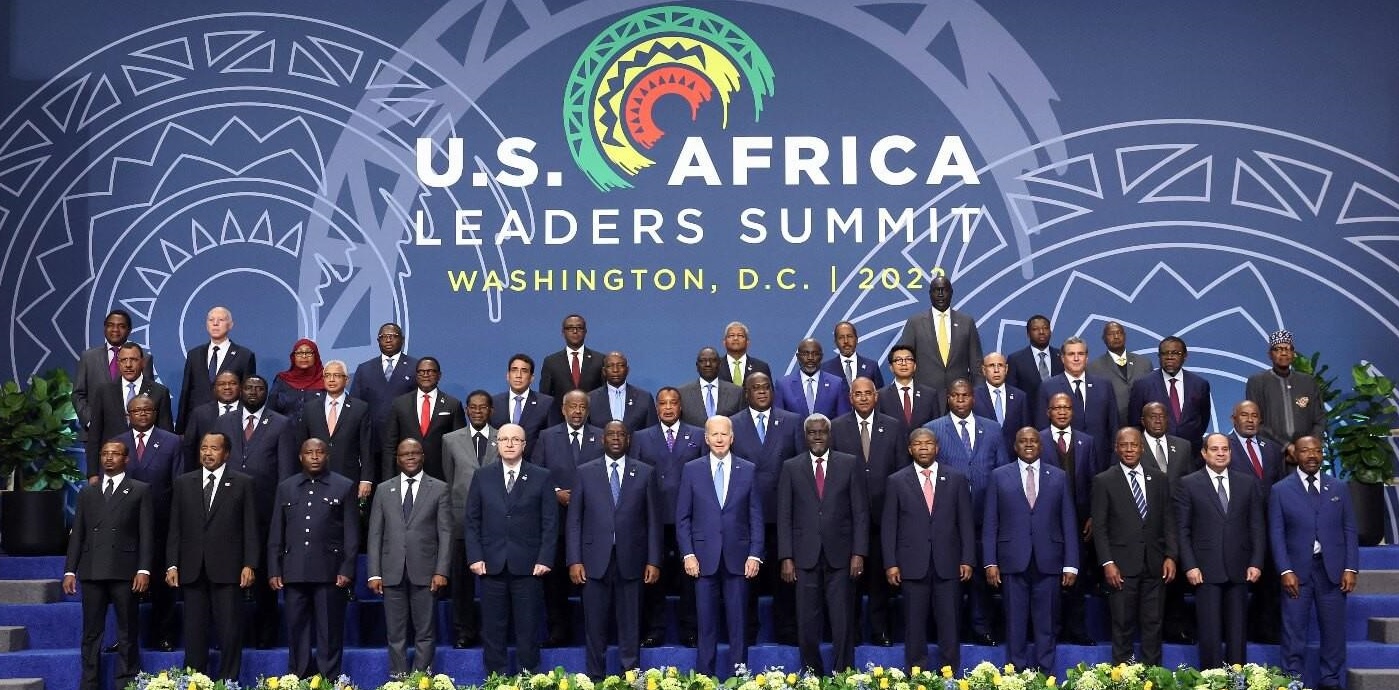The world is again at a major inflection point. As the Transatlantic Alliance strives to ensure successful defense of a rules-based international order, expand markets, build supply chain resilience, and reduce strategic dependencies on Russia and China, geopolitical and economic tailwinds favor Africa as an investment destination. However, Africa must come prepared with a unified, clearly-articulated theory of development and philosophy of engagement.
Against the compounding impact of the climate crisis, global pandemic and consequential economic challenges, there is an emerging great-power competition between Transatlanticism’s vast network of democratic alliances and authoritarian surveillance-state systems led by Russia and China. The Transatlantic Alliance, broadly defined, includes the United States and Canada in North America; and a NATO-EU strategic partnership between member-states of the North Atlantic Treaty Organization (NATO) and the European Union (EU).
Russia’s malign influence
President Joe Biden’s foreword in the 2022 U.S. National Security Strategy (NSS), classifies Russia an immediate disruptive threat to the free and open international system that recklessly flouts the basic laws of the international order. Notably, Russia invaded Ukraine in February 2022, in an attempt to topple its government and bring Ukraine under Russian control. Russia’s invasion and disruptions at Ukraine’s Black Sea ports fuel higher commodity prices, higher food and headline inflation, and reduced financing flows into Africa. Russia also undermines constitutional order in Africa by engineering security-for-resources dependency with autocratic regimes, especially in the Central African Republic, Mali, Burkina Faso, and the geopolitically-important Sahel region.
China’s malign influence
The Transatlantic Alliance considers China its most capable strategic competitor, despite Russia’s disruptions. According to the 2022 U.S. NSS, China is “the only country with both the intent to reshape the international order, and, increasingly, the economic, diplomatic, military and technological power to advance that objective.” For instance, China does not adhere to global trading norms, choosing instead to double down on an authoritarian state-centered, non-market economic-system, which reinforces a zero-sum dynamic where China’s growth and success come at the particular expense of Transatlantic Alliance countries. As one example, state subsidy on steel has given China 60% of global production and, correspondingly, employment in US steel has dropped 40% since the year 2000.
China’s coercion of Western multinationals into forced technology transfers for market access, underscores a systemic disregard for global trading norms. In addition to pernicious trade policies, Chinese military routinely disrupts freedom of navigation in the South China Sea, and its aircrafts now violate the median line of the strait with Taiwan, an unofficial border that both sides largely respected for decades. In response, President Joe Biden reaffirmed America’s commitment to defend Taiwan against an invasion by China.
While President Biden’s commitment is reassuring, it should not be America’s exclusive preserve to guard against reorientation of international order towards authoritarianism.
The case for strategic cooperation with Africa
As the Sino-Russian axis of autocracy continues to challenge long-held security and economic assumptions, Africa has become an invaluable partner in the Transatlantic Alliance goal of strategic resilience. Cooperation with Africa may build on existing strategic frameworks, including Africa-EU Partnership and NATO-AU Cooperation, complemented by bilateral relations between member-states.
Africa’s value proposition
African nations will comprise 25% of the world’s population by 2050 and, therefore, are legitimate stakeholders in the international community. The 54 nations of Africa are the largest voting bloc in the United Nations (UN) General Assembly, and their vote will be crucial to protect the legitimacy and values of a rules-based international order. Africa’s resource endowments can strengthen Transatlantic Alliance’s resilience against strategic vulnerabilities to Russia’s weaponization of hydrocarbons, and China’s coercive policies that distort global markets.
These additional comparative advantages further make Africa an attractive investment destination. According to the UN, Africa is home to 30% of the world’s mineral reserves, eight percent of the world’s natural gas and 12% of the world’s oil reserves. Additionally, 40% of the world’s gold, up to 90% of chromium and platinum, the largest reserves of cobalt, diamonds, and uranium in the world are in Africa. So are 65% of the world’s arable land and 10% of the planet’s internal renewable fresh water source.
The Transatlantic Alliance must present a contrasting and equitable market-driven approach to African security and development
Yet, challenges exist to a Transatlantic Alliance strategic cooperation with Africa, especially China’s Belt and Road Initiative (BRI), a multi-billion-dollar infrastructure investment platform, which occupies an economic void in Africa. Transatlantic Alliance’s strategic engagement with Africa should, by necessity, present a contrasting equitable approach backed by considerate multilateral institutions. A good first step will include support for a transparent market framework for Africa’s natural resource sector, especially beneficiation of Rare Earth Elements (REEs). Underregulated mines and the opacity of Chinese REEs mining contracts in Africa, at a minimum, pose reputational challenges for Transatlantic Alliance multinationals. Worse, they also create an enabling environment for corruption, and a concurrent increase in debt leverage vulnerability for African countries. Notably, REEs 17 elements are essential to microchips and other transformative technologies, green economy, and sustainable development.
Because Africa’s population growth requires the creation of 25 million jobs annually, reorienting Transatlantic Alliance REEs supply chains through Africa, from mining to beneficiation from downstream processing, can spark industrialization in Africa, the world’s largest free trade area and a 1.2 billion-person market. Investments in REEs supply chains will however require a fairer carbon trading market that addresses integrity and transparency concerns. Currently, Africa earns less than $10 per ton of carbon, while other regions secure over $100 for the same amount.
Africa’s theory of development and engagement philosophy
Africa will not become a pawn in a great power competition between the Transatlantic Alliance of democracies and Sino-Russian axis of autocracy if a united Africa engages the international community with an endogenous theory of development, and moral clarity on non-negotiable defense of a rules-based international order that reflect African equity and strategic interests.
Theory of development should also contemplate a just energy transition that develops Africa’s natural gas resources to meet domestic energy needs and industrialization goals, at competitive costs. Additionally, Multilateral Development Banks (MDBs) should prioritize increased financial flows to Africa’s energy sector, especially as estimates suggest Africa needs $190billion annual investments between 2026 and 2030 to meet energy needs and climate goals. Lastly, MDB financing should be guided by the U.N.’s 2022 FSDR three sets of ameliorative actions for Africa’s heightened debt risks:
- Address finance gaps.
- Address rising costs of borrowing.
- Address heightened debt risks.
According to President Macky Sall of Senegal, Chair of the African Union, “Africa needs justice and equity in international relations to build its own destiny.” This Africa-centric new world order is undergirded by the United States’ $55 billion commitment to Africa over three years, support for African Union’s permanent membership in the G20, and Ambassador Johnnie Carson’s appointment as Special Presidential Representative for U.S.-Africa Leaders Summit Implementation. The U.S.-Africa Leaders Summit is also a strategic commercial diplomacy blueprint for the Transatlantic Alliance’s support for African initiatives to build its own destiny.
About the Author
Commissioner O. Felix Obi, MPM, is experienced in commercial diplomacy, a member of the Executive Office of the U.S. President’s (EOP) Trade Advisory Committee on Africa (TACA), at the Office of USTR. Felix is also Chair of the Economic & Trade Development Taskforce (Africa Commission) at the Maryland Governor’s Office of Community Initiatives (GOCI). Felix was Biden-Harris 2020 Campaign’s Policy & Communications Chair for African Diaspora engagement, among other roles. He is a World Trade Center Institute 2021 Bowe Fellow, and an alumnus of the McCourt School of Public Policy at Georgetown University, where he served two terms on the McCourt School Alumni Board. Twitter: @OFelixOb


1 thought on “Africa-centric New World Order: A Transatlantic Alliance in Commercial Diplomacy”
Comments are closed.